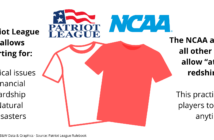When Greg Makris, ’20, sustained a leg injury a few weeks ago, his experience at Lehigh changed dramatically.
Getting around a mountainous campus on crutches was challenging and hindered him from attending some of his classes. These difficulties, combined with his inability to use the bus and the lack of parking spaces near academic buildings, have affected his academic performance.
For the past two weeks, Makris has reached out to the Dean of Students Office to help accommodate his campus mobility. He said associate dean Lori McClaind, who works in the Office of Academic Transitions, has been especially helpful.
McClaind wrote in an email that the Dean of Students Office can provide support in a number of ways, depending on the student’s issue. She also wrote that the Office of Academic Transitions is able to communicate with professors to ensure they are aware of a student’s situation.
“A significant part of the support plan is communication and making sure that professors are aware of the situation,” McClaind wrote. “From there, students can work with their professors to get back on track with their coursework. Our office can also meet with students as they are navigating that process and provide any support they may need along the way.”
Makris said his professors have been understanding of his injury, and McClaind has helped him figure out an exam schedule that accommodates his surgery this weekend.
Makris said McClaind has also helped him figure out ways to get around campus.
“(McClaind has) been helping me a lot more than Parking Services,” Makris said. “She had to reach out to Parking Services for me about my situation, and she pushed for me to get everything transportation-related in place.”
Makris said he has tried taking the buses, but they have not been an effective way of traveling between classes.
“I don’t take the buses often, especially because I just recently was in a situation where I fell and got hurt,” Makris said. “I was trying to hop onto the second deck of bus in the back to get a seat, and I tripped and fell because it’s just not handicap-friendly.”
Makris also said bus routes do not allow him to get between classes efficiently.
“The bus is doable in some cases, but if I have a class at Neville and it ends at 10 a.m. and I have a class over at Mohler at 10:10 a.m.,” Makris said. “I can’t crutch over there that fast, and the bus routes don’t stop near there.”
Makris also reached out to Parking Services for handicapped parking. While he was able to obtain a handicapped parking permit, he said there is a limited number of handicapped parking spots near his classes. He said the handicapped spots near his classes are frequently taken, giving him no choice but to use metered parking.
University architect Brent Stringfellow said although handicapped parking spaces aren’t in ideal spots, the university meets the legal requirements for accessible parking.
“Where you tend to see the accessible spots are the large spots in the parking garages and the bigger lots where they tend to be more public,” Stringfellow said. “There may be smaller lots that don’t have designated spots there because there are spots available in the large lots nearby.”
Another issue Stringfellow has is that some parking lots do not have an accessible path of travel.
“If you put a handicapped parking space in a lot that’s not accessible to anything, it’s worse because you’ve just stranded someone,” he said, “so we have to be mindful that our parking lots are in places with accessible entryways.”
Like parking lots on campus, buildings are also fully compliant with Americans with Disabilities Act standards. However, some academic buildings do not have elevators, which poses another challenge to students who are temporarily or permanently handicapped.
The ADA requires all new buildings to have accessible entryways and elevators. However, the act was not passed until 1990, so structures built before this time are not required to meet the demands of this law.
Stringfellow said because the majority of Lehigh’s campus was built prior to 1990, Lehigh is in a position where it is constantly trying to catch up and modernize. He said the university is doing as much as it can to accommodate its students.
He said updating the university’s accessibility is especially challenging because Lehigh is on the slope of a mountain, which makes the campus inherently inaccessible. To combat this, the Facilities Services/Campus Planning and Projects department uses a strategy that views the campus as a tiered, terraced structure and creates relatively flat east-west paths.
“We started to organize the campus based on these east-west paths so that (students) can get place to place and use elevators in buildings to get up the side of the mountain,” Stringfellow said.
Makris is also a member of a fraternity with a dorm on the Hill.
“I feel like (having an injury or disability) would probably deter students who want to rush,” he said. “Because everything becomes much more difficult for anyone with a leg-related injury to get up on the mountain, having to go that much farther up would probably deter them from wanting to rush.”
Students can use the Lehigh Live app to find wheelchair-accessible residence halls, parking lots and academic buildings.
There are no Greek houses with full wheelchair accessibility, according to the map. Across the entire campus, there are only a select few residence halls with accessibility.
“The residential buildings tend to divide in terms of which are accessible,” Stringfellow said. “If we have a student with needs, we assign them to an accessible residence hall, so we are able to accommodate in that sense.”
Stringfellow said all new university projects will be fully ADA-compliant. One of the biggest projects coming up is the renovation of Chandler-Ullmann to include accessible entryways, elevators and restrooms. Construction will start in 2018 and will likely take over a year to complete.
Although the Dean of Students Office and professors have been helpful, Makris said he wishes Lehigh had more services or a better plan for helping students with injuries like his.
“I think as soon as an injury happens, as soon as a student reaches out, there should be an office for their needs,” Makris said. “This happens often enough that there should be vans that can bring you to your classes. I wish they planned for these situations more, understanding that their campus is especially difficult to travel around.”





Comment policy
Comments posted to The Brown and White website are reviewed by a moderator before being approved. Incendiary speech or harassing language, including comments targeted at individuals, may be deemed unacceptable and not published. Spam and other soliciting will also be declined.
The Brown and White also reserves the right to not publish entirely anonymous comments.